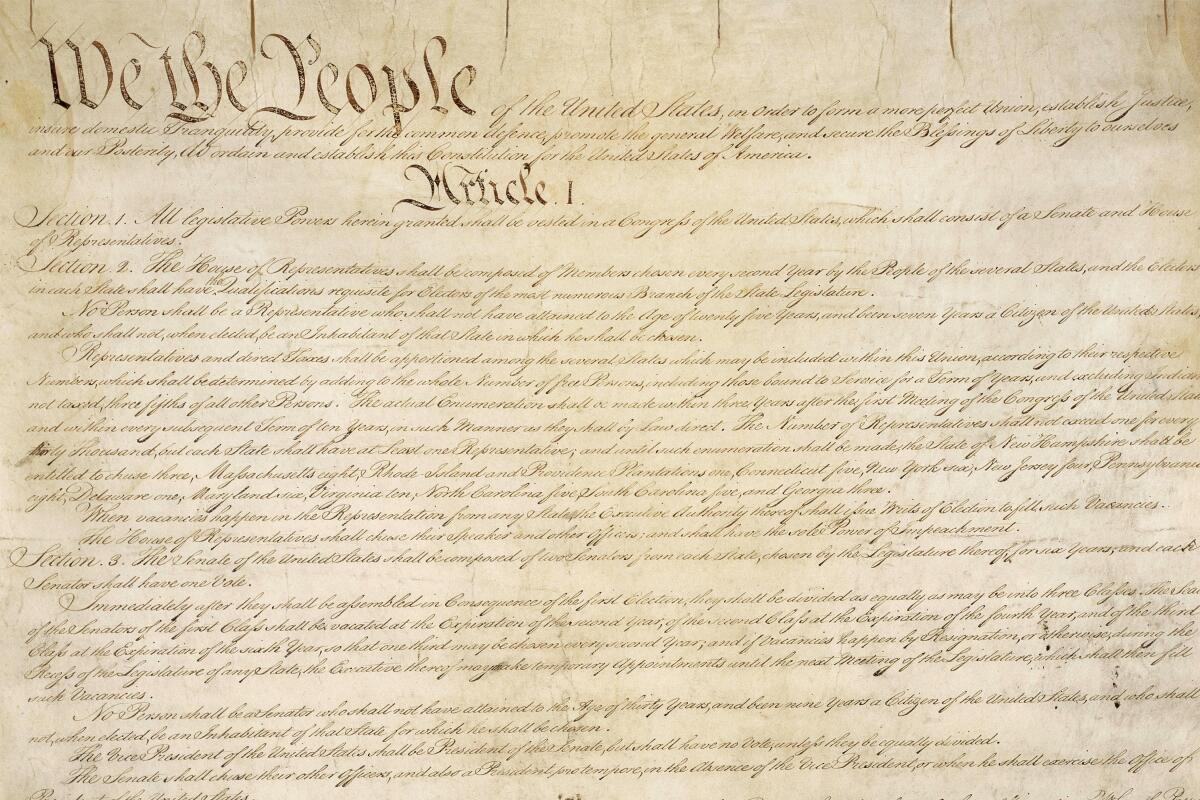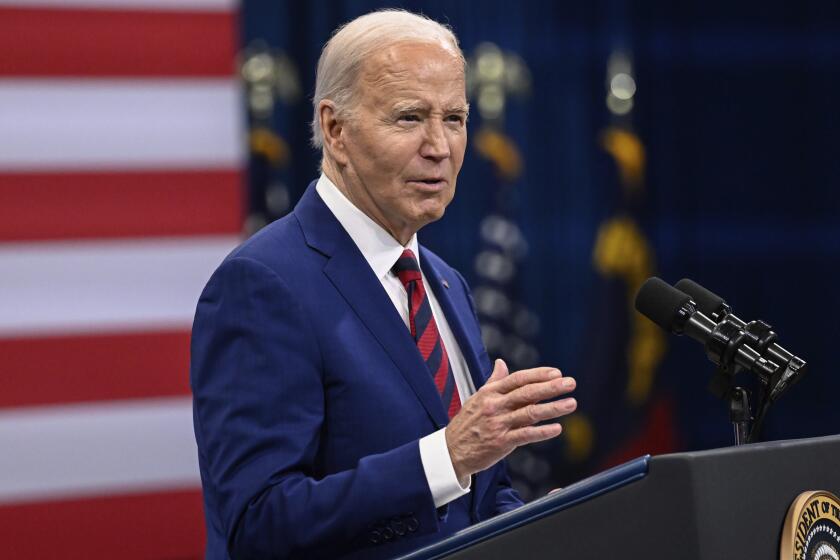Don’t want Biden or Trump to have so much power? Maybe the U.S. needs a poly-presidency

- Share via
At the Constitutional Convention in 1787, Pennsylvania delegate James Wilson brought up a seemingly un-American idea. He said the executive branch of America’s government should be headed by a single person: a president.
Several constitutional delegates objected. A single leader at the helm? Virginia delegate Edmund Randolph said this was the “fetus of monarchy.” America had just fought a bloody war to free themselves of a king. Why would they want another?
Randolph and his allies believed the executive branch, like the legislative, should spread power among several people. Perhaps a council of three presidents, or even, as Benjamin Franklin had gone on the record endorsing in previous years, a group of 12 executives.
History shows that fascists get more extreme with time. Anywhere they have come to power, they have done so through an electoral system, with support from a significant segment of voters, in alliance with conventional conservatives.
Wilson eventually persuaded the other delegates that several presidents would cause too much infighting, and the states voted 7 to 3 for a single president.
But what if Randolph was right? Modern presidents exercise power undreamed of by the Founding Fathers.
Consider that George Washington issued eight executive orders in eight years while Barack Obama issued 276 in his eight years and Donald Trump 220 in just four. Or look at war powers, which are supposed to be divided. The Constitution gives Congress the power to declare war and the president the job of prosecuting that war. But now, for the most part, the president starts, executes and ends conflicts.
The Founders would be aghast. The fetus of monarchy has become a toddler, maybe even a tween. And Trump has made it clear that if he wins, it will become a strapping young adult.
So how can we stop this seeming slide toward authoritarianism? Perhaps we should revive that runner-up idea from the Constitutional Convention and split up the presidency. Break it into pieces like we did Ma Bell in the 1980s.
Most of those known as ‘double haters’ will come around to support one of the two major party presidential nominees. But some, like Victoria Thompson, won’t back Trump or Biden under any circumstances.
I first stumbled upon this admittedly unlikely notion when studying James Madison’s notes from the Constitutional Convention while working on a book in which I tried to understand the original meaning of the Constitution and exercise all of my rights. I decided to use my 1st Amendment right to petition Congress, asking it to reconsider the idea of three presidents.
I carried my petition to cocktail parties and parent events at my kids’ school. After a couple of weeks, I had 300 signatures and just as many skeptics who refused. I knew it was a long shot. And honestly, I’m not sure I wanted it to succeed. Multiple presidents might have multiple unintended consequences. But I wanted to use the topic as a way to highlight the problem of our country’s steroidal presidential power.
Is a poly-presidency even possible? Multiple leaders are unusual, but not unheard of. Political scientist Dan Carpenter told me, “There’s a lot of talk in political science circles right now about the idea of multiple leaders.”
The Roman Empire was ruled for 500 years by two consuls who shared power. Nowadays, a handful of nations have multiple heads of state, including Switzerland, which has, in effect, seven presidents. It’s ruled by an executive council of seven politicians, each from a different region. Each council member serves a one-year term as the ostensible head, but the role is mostly ceremonial. Decisions are made by majority vote. Does it work? According to the nonpartisan V-Dem Institute, Switzerland ranks first in the world for participatory democracy. (The United States ranks 25th.)
Americans say they don’t want a president to have too much power, but that view shifts if the candidate of their party wins the presidency, a poll finds.
Some of the Founders had a similar system in mind. Randolph suggested three presidents, one each from the North, South and middle states. Perhaps regional presidents is the way to go. Or perhaps it would be better to have the top three vote-getters from anywhere in the country.
The hope is that this type of system would reduce the chance of extremism. And maybe it’s no coincidence that Switzerland has resisted the extremism of some other European nations.
Some who were skeptical of my petition wondered if a poly-presidency would create more gridlock. It’s a valid point. My responses include: Switzerland seems to work (though maybe the Swiss are just a lot more polite). Also, if the decisions merely need a majority of presidents (as opposed to unanimity), could a triumvirate really cause such a slowdown? And third, maybe more speed bumps in the presidency would be a feature, not a bug. The Founders recognized the importance of hurdles to reduce rash decisions. The problem now is that Congress has too many speed bumps and the president too few.
I eventually brought my petition to a meeting with Sen. Ron Wyden (D-Ore.). He was surprisingly supportive: “You are injecting logic and common sense, which often is lacking in public discourse.”
So did I have the senator’s backing?
“I’ll give it some consideration,” he said, and then clarified: “That’s what’s called an under-promise.”
Wyden won’t advocate for co-presidents, but he did agree that we need to curb the expanding power of the office of president.
We can accomplish this in many ways without radically restructuring the government. One idea: Nix the supermajority requirement in the Senate. To pass any real legislation, the Senate now needs a supermajority of 60 votes. This rule is not in the Constitution and makes it overly difficult for Congress to act.
Another strategy would be for Congress to reclaim some of its constitutional powers. In fact, the very morning of my meeting with Wyden, he had met with the Biden administration about getting Congress to reclaim some of the power to set tariffs.
I wished the senator Godspeed, and I think the Founders would too.
A.J. Jacobs is a journalist, podcaster and author. His next book, “The Year of Living Constitutionally,” will be published May 7.
More to Read
A cure for the common opinion
Get thought-provoking perspectives with our weekly newsletter.
You may occasionally receive promotional content from the Los Angeles Times.












